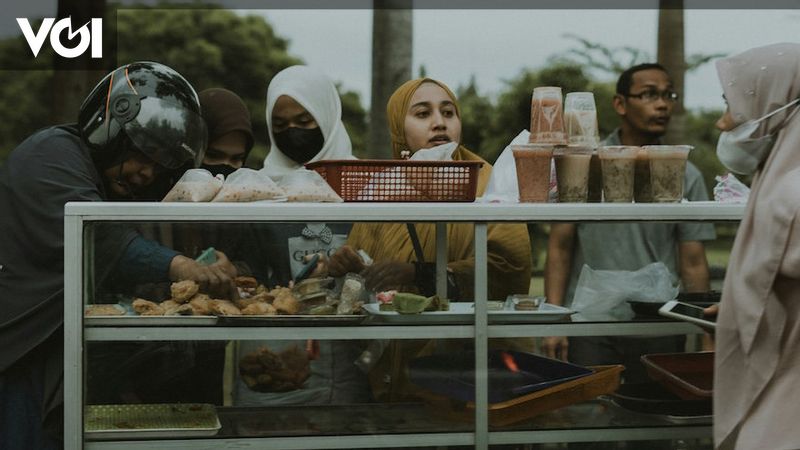JAKARTA Food is seen as a gift from Allah SWT that should be grateful for and should not be wasted. But unfortunately, food wasted during Ramadan is still a problem in Indonesia.
Ramadan is a special month for Muslims around the world. Quoting the page of the National Amil Zakat Agency, there are several virtues of Ramadan, namely the month of the lowering of the Koran, the closing of the night of Lailatul Qadar, the closing of the door of surprise and the closing of the door of hell, and the obligation to fast Ramadan.
Ramadan fasting orders are contained in the Qur’an Surah Al-Baqarah verse 183, which means O believers! It is obligatory for you to fast as it is obligatory for people before you so that you are afraid.
Apart from being a means of slavery to Allah, fasting also has a number of goals, one of which is against lust, including the desire to buy food in large quantities which lead to in vain.
But unfortunately, the large amount of food wasted during Ramadan is still an issue that has attracted attention until now. Indonesia itself is still facing an emergency food waste, which places the country of more than 200 million people ranked fourth in the world.
The United Nations Environment Program (UNEP) report with the title Food Waste Index 2021 notes that the total food waste in Indonesia reaches 20.93 million tons per year. This figure places Indonesia in the fourth largest food waste printing country in the world, after China, India, and Nigeria. Even in Southeast Asia, Indonesia is ranked first in the country with the highest food waste.
Meanwhile, from a study by the Ministry of National Development Planning (Bappenas) from 2000 to 2019, Indonesia dumped food waste up to 23-49 million per year or the equivalent of 115-185 kilograms per capita in one year.
In addition to problems with the environment, wasted food also provides losses from an economic perspective of around Rp. 231 to Rp. 551 trillion per year. This amount should be able to feed up to 40 percent of Indonesia’s population.
Then, why waste waste or food waste still occurs during Ramadan, even though the logic is that when fasting the community should be able to refrain from buying large quantities of food, which in the end ends up in a trash can.
Lust to eat that is passionate after hanging around for a day often gives rise to late eyes and wants to eat various foods. When you buy food to break the fast, you can call it emotional eating. According to nutritionist Rita Ramayulis DCN, MKes, emotional eating is a condition in which a person has an excessive desire to eat. During fasting, emotional eating tends to be high because of the hunger condition.
In fact, after approximately 12 fasting, the body needs adjustments to receive food. Not infrequently, a lot of food is left and it has the tail of being trash because you don’t have to eat too much when breaking the fast.
According to a survey by the DKI Jakarta Sanitation Service in 2016, the volume of waste increased by 10 percent in the first 10 days of Ramadan, and everything was dominated by food waste.
The increase in food waste during Ramadan is a sad fact. Ustad Muhammad Azhari Nasution in the Ummah4Earth Study said that when someone does not succeed in restraining the desire to take various foods when breaking the fast, it has the potential to cause food waste.
In Islam, the teachings so as not to throw away food are contained in the Qur’an Surat Al-A’raf verse 31 which means ‘Wow, Adam’s children, use your beautiful clothes on every (entering) mosque and eat and drink it, but don’t overdo it. Indeed, Allah doesn’t like excessive people.’
“Islam views the food in the middle, meaning it should not be excessive, the portion should not be too much so there is no waste of food,” said Ustad Azhari on the Green Peace Indonesia YouTube channel.
“Why waste waste happens? That’s because people stock up on too much food, which ends up not eating and rots, expires, and so on,” he added.
Indonesia as the country with the largest Muslim population in the world, has the potential to increase the amount of food waste if during Ramadan it is unable to refrain from buying food as needed.
“Being a rational Muslim is not emotional about food. Sometimes we consume food not because we need it, but because we are emotional,” said Ustad Azhari again.
The phenomenon of food waste in Indonesia is an irony. On the one hand, awareness about food waste is still low, whereas on the other hand, about 20 percent of the population in the country is experiencing hunger. It is better for Ramadan to be used as an opportunity to endure lust, including excessive appetite for food.
The English, Chinese, Japanese, Arabic, and French versions are automatically generated by the AI. So there may still be inaccuracies in translating, please always see Indonesian as our main language.
(system supported by DigitalSiber.id)

